The Berkman Klein Center for Internet & Society's Internet Monitor project publishes a series of special reports that focus on key events and new developments in Internet freedom and online activity, incorporating technical, legal, social, and political analyses. The project also publishes an annual report each fall that provides expert analysis on the state of the global Internet.
We welcome feedback on these publications. Comments are welcome on the Internet Monitor website or can be sent directly to the authors.
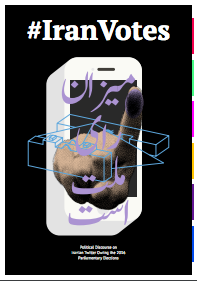 | #IranVotes: Political Discourse on Iranian Twitter During the 2016 Parliamentary Elections Although Twitter remains blocked by the Iranian authorities, the widespread use of circumvention tools by Iranian citizens has allowed them to make use of it as a free and open space for public engagement around contentious and divisive political and social issues. Using a mixed-methods approach combining social network analysis with qualitative content analysis of election-related content of the Iranian Twittersphere during the elections, we identify and analyze 46 clusters of users ranging from human rights activists through to reformist and conservative political commentators, technology advocates, and literature enthusiasts. In addition to these interest-bound clusters, we also observe that the network is home to extensive networks of everyday users, who share jokes, idle chatter, and flirtatious messages. Although the Twittersphere hosts a significant volume of political content, it is by no means a purely political space. |
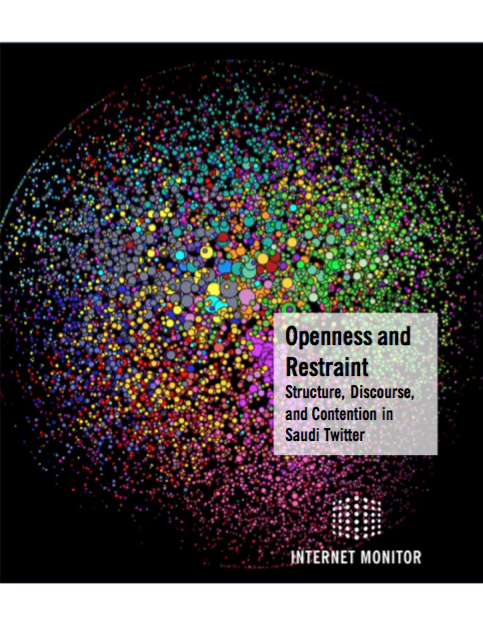 | Openness and Restraint: Structure, Discourse, and Contention in Saudi Twitter Social, political, and religious content online is highly filtered by the Saudi government, and the offline media are tightly controlled. Twitter, however, is comparatively open: Saudi censors are unable to block individual accounts or tweets without blocking the entire site, and the site remains accessible for Saudi users. As a result, the platform has flourished. Saudi Arabia has a higher percentage of Twitter users than any other country in the world, and nearly a third of all tweets in the region come from Saudi Arabia. “Openness and Restraint,” authored by Helmi Noman, Robert Faris, and John Kelly, maps and analyzes the structure and content of the Saudi Twittersphere and identifies the communities that coalesce around different political, religious, social, and cultural topics and viewpoints. |
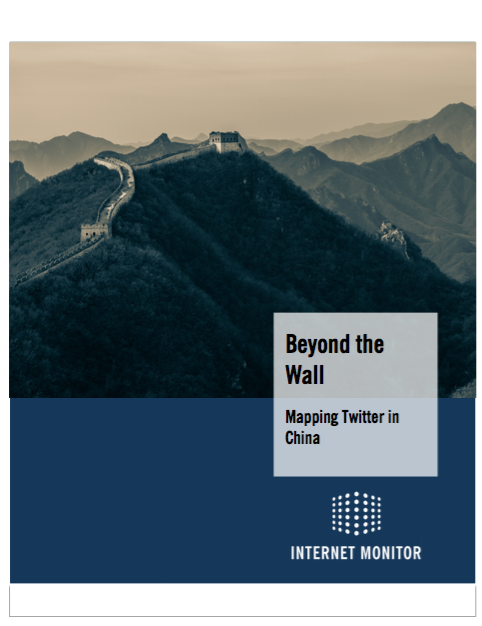 | Beyond the Wall: Mapping Twitter in China For Internet users that reside in mainland China, Twitter offers access to news from around the world and a wealth of ideas and perspectives that might otherwise be unavailable there, as well as a platform for building online communities that is not under direct control of the government. This study of Chinese Twitter—to our knowledge the first such study—offers a unique window into the online activities and global connections of Chinese Internet users who actively circumvent content restrictions. Based on a mixed-methods approach, combining social network analysis and a qualitative review of the content and activity of Chinese Twitter, we are able to map and provide detailed accounts of the topically based clusters that form among these networks. |
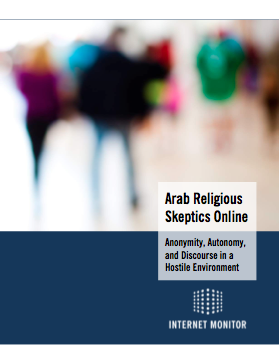 | Arab Religious Skeptics Online: Anonymity, Autonomy, and Discourse in a Hostile Environment The Arab atheist community is largely an online phenomenon, with limited visibility offline and with virtually no umbrella groups. It exists in unfriendly, if not hostile, political, social, religious, and legal environments. This paper aims to deepen our understanding of virtual space by analyzing the Arab atheist community online: its content, discourse, and structure. The research examines the relationship between the networked information economy and the emergence of religious skeptics as manifested in Arab cyberspace. A central question is whether the Internet enhances individual autonomy in matters of faith. Given that the Arab atheist community online is prevailingly anonymous, the paper assesses the potential and limitations of anonymous and pseudonymous speech online and the extent to which this facilitates or hinders sharing, debating, community building, and collective action. |
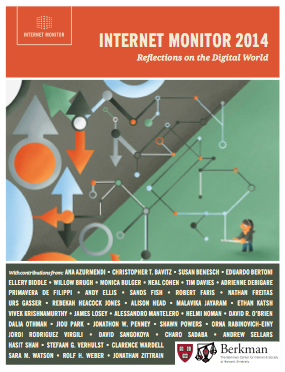 | Internet Monitor 2014: Reflections on the Digital World The Internet Monitor project's second annual report is a collection of roughly three dozen short contributions that highlight and discuss some of the most compelling events and trends in the digitally networked environment over the past year. The publication, intended for a general interest audience, covers a broad range of issues and regions, including an examination of Europe’s “right to be forgotten," a review of the current state of mobile security, an exploration of a new wave of movements attempting to counter hate speech online, and a speculative fiction story exploring what our increasingly data-driven world might bring. The report focuses on the interplay between technological platforms and policy; growing tensions between protecting personal privacy and using big data for social good; the implications of digital communications tools for public discourse and collective action; and current debates around the future of Internet governance. |
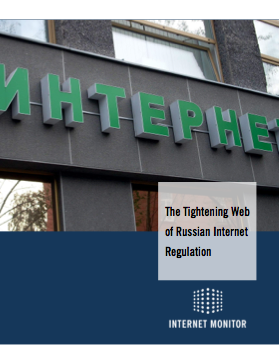 | The Tightening Web of Russian Internet Regulation Over the past two years, systematic Internet regulation has increased more in Russia than anywhere else in the world. A series of progressively more restrictive legislative developments between the summer of 2012 and the summer of 2014 have increased the power of the Russian Prosecutor General’s Office and federal agency Roskomnadzor to block or take down websites for a wide range of alleged infractions. New legislation has also mandated the registration of bloggers with the federal government and greatly increased Russian law enforcement access to user data, among other changes. This paper examines this growing web of regulations and explores how Russian Internet users and freedom of information advocates are responding through online and offline protests, circumvention, and a range of other tactics. |
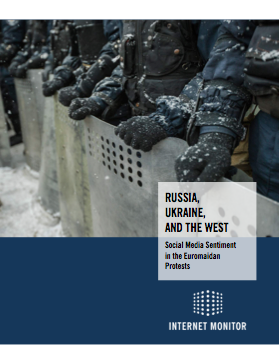 | Russia, Ukraine, and the West: Social Media Sentiment in the Euromaidan Protests This paper investigates sentiment in the online conversation about the Ukrainian Euromaidan protests across a range of English- and Russian-language social and traditional media sources. Results from this exploratory research show more support for the Euromaidan protests in Russian-language sources, including among sources and users based in Russia, than originally expected. Sentiment in English-language sources, including those located in the United States and United Kingdom, is more negative than anticipated given the rhetorical support among western governments for the Euromaidan protests. However, social media content in Ukraine, the US, and the UK is more positive than traditional media outlets in those countries. |
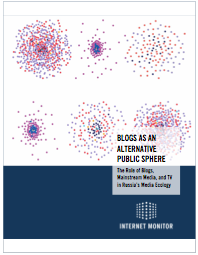 | Blogs as an Alternative Public Sphere: The Role of Blogs, Mainstream Media, and TV in Russia’s Media Ecology Applying a combination of quantitative and qualitative methods, we investigate whether Russian blogs represent an alternative public sphere distinct from web-based Russian government information sources and the mainstream media. Based on data collected over a one-year period (December 2010 through December 2011) from thousands of Russian political blogs and other media sources, we compare the cosine similarity of the text from blogs, mainstream media, major TV channels, and official government websites. We find that, when discussing a selected set of major political and news topics popular during the year, blogs are consistently the least similar to government sources compared to TV and the mainstream media. We also find that the text of mainstream media outlets in Russia (primarily traditional and web-native newspapers) are more similar to government sources than one would expect given the greater editorial and financial independence of those media outlets, at least compared to largely state-controlled national TV stations. We conclude that blogs provide an alternative public sphere: a space for civic discussion and organization that differs significantly from that provided by the mainstream media, TV, and government. |
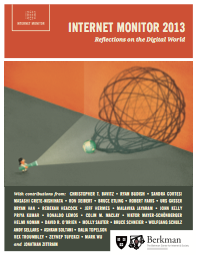 | Internet Monitor 2013: Reflections on the Digital World Internet Monitor 2013: Reflections on the Digital World, the Internet Monitor project's first-ever annual report, is a collection of essays from roughly two dozen experts around the world, including Ron Deibert, Malavika Jayaram, Viktor Mayer-Schönberger, Molly Sauter, Bruce Schneier, Ashkan Soltani, and Zeynep Tufekci, among others. The report highlights key events and recent trends in the digital space. To mirror the collaborative spirit of the initiative, we compile—based on an open invitation to the members of the extended Berkman community—nearly two dozen short essays from friends, colleagues, and collaborators in the United States and abroad. The result is intended for a general interest audience and invites reflection and discussion of the past year’s notable events and trends in the digitally networked environment. Our goal is not to describe the “state of the Internet” in any definitive way, but rather to highlight and discuss some of the most fascinating developments and debates over the past year worthy of broader public conversation. |
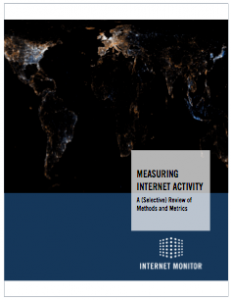 | Measuring Internet Activity This paper seeks to describe the conceptual and practical impediments to measuring and understanding digital activity and highlights a sample of the many efforts to fill the gap between our incomplete understanding of digital life and the formidable policy questions related to developing a vibrant and healthy Internet that serves the public interest and contributes to human wellbeing. Our primary focus is on efforts to measure Internet activity, as we believe obtaining robust, accurate data is a necessary and valuable first step that will lead us closer to answering the vitally important questions of the digital realm. |
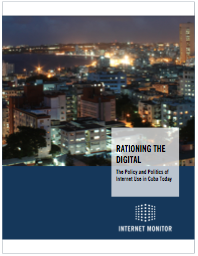 | Rationing the Digital: The Policy and Politics of Internet Use in Cuba Today Cuba has one of the lowest Internet penetration rates in the Western hemisphere and is routinely ranked among countries with the highest restrictions on Internet use in the world. But within both categories, it is something of a rare bird. While the precise number of Internet users in the country is difficult to calculate, it is clear that a lack of infrastructure, combined with economic and political hurdles, has left access to the global Internet out of reach for most Cubans. But this may soon change. This spring, the country’s only telecommunications firm, the state-owned ETECSA, activated two undersea fiber optic cables that are set to drastically increase connection speeds in Cuba; the firm also opened over 100 cybercafes across the island. Officials have since made public promises to increase access and lower currently exorbitant fees for Internet use. This could fundamentally change the island’s information economy. |
